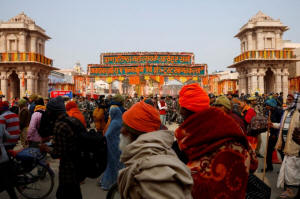Controversy erupts over Hindu temple float at New York's India Day
parade
 Send a link to a friend
Send a link to a friend
 [August 17, 2024]
By Kanishka Singh [August 17, 2024]
By Kanishka Singh
(Reuters) - A carnival float featuring a Hindu temple that is planned
for an upcoming India Day Parade in New York City has sparked
controversy, with a number of groups calling it anti-Muslim and saying
it should be removed from the event.
The float depicts a temple to the Hindu god Lord Ram, which was
consecrated earlier this year on a site in Ayodhya, India, believed to
be his birthplace. But the temple site has long been bitterly contested
between Hindus and Muslims, and in the early 1990s a mosque that stood
there was razed by a Hindu fundamentalist mob.
Some U.S.-based organizations have written a letter to New York City
Mayor Eric Adams and New York Governor Kathy Hochul, calling the float
anti-Muslim and saying it glorified the mosque's takedown.
Among groups who signed the letter were the Council on American Islamic
Relations, the Indian American Muslim Council and Hindus for Human
Rights.
"This float's presence represents these groups' desire to conflate Hindu
nationalist ideology with Indian identity, but India is a secular
country," the letter said.

The Vishwa Hindu Parishad of America, which is organizing the float,
says it represents a Hindu place of worship and aims to glorify a deity
seen as an important part of Indian and Hindu identity. The Hindu
American Foundation said it was an exercise of free speech.
The Federation of Indian Associations, which runs Sunday's event, said
the parade represents India's cultural diversity and will feature floats
from a range of communities.
"There's no room for hate," Adams said at a press conference earlier
this week. "If there is a float or a person in the parade that's
promoting hate, they should not."
[to top of second column]
|

Hindu devotees wait to enter the Hindu god Lord Ram temple after its
inauguration in Ayodhya, India, January 23, 2024. REUTERS/Adnan
Abidi/File Photo

Adams' office later told the Associated Press that the U.S.
Constitution's First Amendment right to free speech prevents the
city from denying a permit or requiring that a float or parade's
message be changed simply because it does not agree with the
content.
Hindus say the site in Ayodhya was holy to them long before Muslim
Mughals razed a temple there to build the 1528 Babri mosque,
destroyed in 1992. The mosque's destruction was followed by
nationwide riots that killed some 2,000 people, mainly Muslims. In
2019, the Indian Supreme Court handed over the land to Hindus.
Human rights experts say India has seen a rise in attacks, including
violence and discrimination, on minorities in recent years under
Hindu nationalist Prime Minister Narendra Modi, accusations that
Modi denies.
The annual New York City parade takes place three days after India's
Independence Day.
(Reporting by Kanishka Singh in Washington, Editing by Rosalba
O'Brien)
[© 2024 Thomson Reuters. All rights
reserved.]This material
may not be published, broadcast, rewritten or redistributed.
Thompson Reuters is solely responsible for this content.
 |